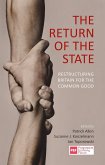UK workers are stuck in a low-pay, low-productivity rut, with far too many people working in poor quality, insecure jobs, with little training or chance of getting on. Katy Jones and Ashwin Kumar question the mantra that "work is the best way out of poverty" and examine the in-work poverty that now defines employment for many.
The state's engagement with people out of work is shown to ignore the needs of lone parents and disabled people, and has little concern for skills and career progression. When coupled with the degradation of social infrastructure, such as child care and transport, the barriers to quality work can become insurmountable. Jones and Kumar's insightful analysis reveals the need to move away from positioning unemployment as a "behavioural problem" to be corrected by coercive labour market policies to one that considers the wider obstacles to better paid, quality jobs.
The state's engagement with people out of work is shown to ignore the needs of lone parents and disabled people, and has little concern for skills and career progression. When coupled with the degradation of social infrastructure, such as child care and transport, the barriers to quality work can become insurmountable. Jones and Kumar's insightful analysis reveals the need to move away from positioning unemployment as a "behavioural problem" to be corrected by coercive labour market policies to one that considers the wider obstacles to better paid, quality jobs.
Dieser Download kann aus rechtlichen Gründen nur mit Rechnungsadresse in A, D ausgeliefert werden.









